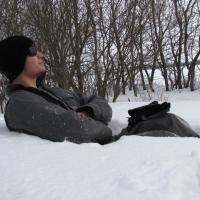Pesan: 65
Bahasa: English
WeekzGod (Tunjukkan profil) 3 Juli 2013 04.16.16
I hate how it sounds and I think it's redundant especially when the speaker is pretty consistent in their word order.
What do you guys think?
Moosader (Tunjukkan profil) 3 Juli 2013 04.22.37
WeekzGod:Though I love most grammatical things about the language, -n is something I cannot stand.I mainly dislike having to add "j" and "n" to corresponding adjectives and such. Doesn't sound natural to me, but probably only because I speak English.
I hate how it sounds and I think it's redundant especially when the speaker is pretty consistent in their word order.
What do you guys think?

I have a hard time figuring out when to use "n" sometimes as well, when I have more complex sentences I'm trying to figure out. :|
Tempodivalse (Tunjukkan profil) 3 Juli 2013 04.39.00
WeekzGod:Though I love most grammatical things about the language, -n is something I cannot stand.Speakers may individually be consistent in their word order, but there is some variance among Esperantists as a group. For instance, while SVO is broadly accepted as "default" among speakers of English and Romance languages, speakers of other languages feel more comfortable with a totally different word order.
I hate how it sounds and I think it's redundant especially when the speaker is pretty consistent in their word order.
What do you guys think?
For instance, one of my native languages is Russian, which has a very free word order. As a result, when speaking in Esperanto my ear often does not feel a need to be consistent in order and I commonly avail myself of SOV and OVS. Many Esperantists don't use these forms, but that doesn't invalidate them.
The accusative is mildly challenging for people who have no experience with cases, but the benefits are obvious. Aside from accommodating speakers of non-SVO languages, the accusative case allows great liberty in poetry, removes any potential of ambiguity in a sentence with direct and indirect object, and looks more interesting on paper (seeing a mass of words end in -o can get a bit dull without some consonants! :wink: )
Doesn't sound natural to me, but probably only because I speak English.Depends. The least natural part about the adjectives in Esperanto, for me, is that they don't have to go before the noun. But that's my bias, because all the other languages I speak put the adjective first. It's all a question of introducing new word orders to your "ear" until they sound normal.
goli (Tunjukkan profil) 3 Juli 2013 04.46.07
rlsinclair (Tunjukkan profil) 3 Juli 2013 06.49.07
- start of rant -
What has put me off Esperanto for life is its misuse.
Objects can either be direct or indirect, so will either take -n or a preposition. People look at this and assume that -n is simply an alternative to a preposition and write nonsense like “lundon, mi marŝis en la domon” instead of “je lundo, mi marŝis al en la domo”.
- end of rant -
evanamd (Tunjukkan profil) 3 Juli 2013 07.07.27
rlsinclair: Can you really have two prepositions for the same noun? I thought that direction and quantity were the other two official uses, not just a new way of using -n
Kirilo81 (Tunjukkan profil) 3 Juli 2013 07.09.11
rlsinclair:What has put me off Esperanto for life is its misuse.I'm sorry, but that rant is totally unfounded; see Fundamenta Gramatiko, §14: "Instead of je, the objective without a preposition may be used, when no confusion is to be feared."
Objects can either be direct or indirect, so will either take -n or a preposition. People look at this and assume that -n is simply an alternative to a preposition and write nonsense like “lundon, mi marŝis en la domon” instead of “je lundo, mi marŝis al en la domo”.
The adverbial accusative is as good, useful, and part of the tradition as the object accusative.
goli (Tunjukkan profil) 3 Juli 2013 07.10.06
rlsinclair:- start of rant ->“lundon, mi marŝis en la domon”
What has put me off Esperanto for life is its misuse.
Objects can either be direct or indirect, so will either take -n or a preposition. People look at this and assume that -n is simply an alternative to a preposition and write nonsense like “lundon, mi marŝis en la domon” instead of “je lundo, mi marŝis al en la domo”.
- end of rant -
But this IS right. Accusative is used for these things. See some information in PMEG about it: http://bertilow.com/pmeg/gramatiko/rolmontriloj/n/...
N-finaĵo povas montri:Even Fundamento has words about it:
objekton
mezuron
tempopunkton
direkton
aliajn signifojn
13. In phrases answering the question „where?” (meaning direction), the words take the termination of the objective case; e. g. kie'n vi ir'as?„where are you going?”; dom'o'n, „home”; London'o'n, „to London”, etc.Actual quote from the Fundamento on the site of Academy of Esperanto: http://www.akademio-de-esperanto.org/fundamento/gr...
rlsinclair (Tunjukkan profil) 3 Juli 2013 07.34.20
evanamd (Tunjukkan profil) 3 Juli 2013 07.47.15
rlsinclair:I agree, it is an official part of the language, which is why I hate Esperanto. If it were just a mistake by individual speakers I would still be supporting the language.Well it's hardly misuse if it's official. But leaving that aside, I don't think it's all that different from having multiple words with multiple meanings, or throwing in all sorts of prepositions or placeholders.




